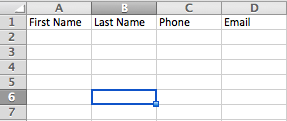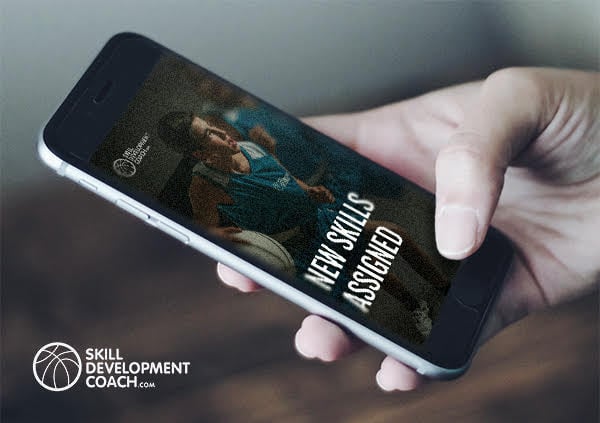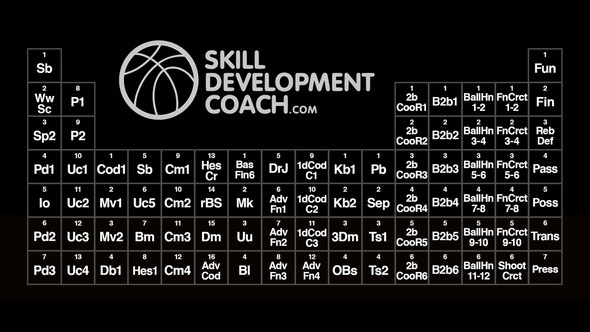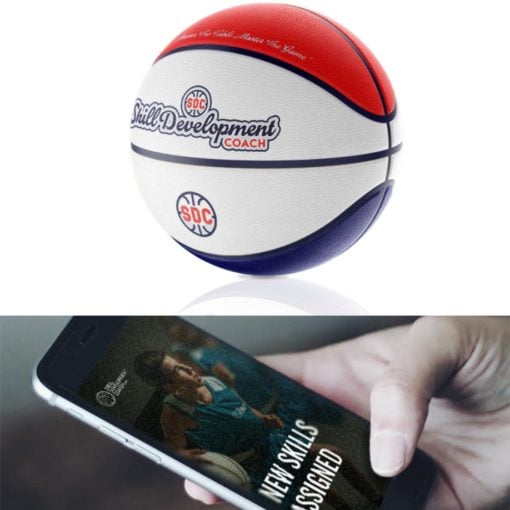HOW TO BECOME A SKILL DEVELOPMENT COACH
HOW TO BECOME A SKILL DEVELOPMENT COACH
For many people, becoming a skill development coach (or basketball trainer) can combine two of the greatest aspects of your life:
1) Basketball 2) Working with kids to help them get better.Becoming a Skill Development Coach is first and foremost about the passion that you have for helping players become great at something that they love -- basketball. It is that mutual love that both you and your basketball training clients have that will bring about better opportunities for all parties. Also know that If you think you are making real money in the basketball business, then you don’t know what real money is. At first, be prepared to make lunch money - especially when you are just getting going. Eventually, you will make decent money if you are good.
Before you take the plunge into starting a basketball training business, don’t skip the first 2 steps below:
Step #1 - Write a statement for you about why you feel that you want to train players.
Get very clear about why you want to train basketball players.
What is your motivation?
- Is it a passion of yours?
- Do you just really love basketball and want to help more kids?
- Is it just another way to make money and have a side hustle?
- Are there trainers in your area that you think that you can do better than?
What is your REAL motivation?
If you are asking yourself, “Why write these things out up front?”
Here is why:
- It will help you get very clear about what your message is to parents and players and the basketball community.
- It will help you create marketing materials that you can use again for a future website.
- It will help you make a stronger commitment to yourself and better understand your motivations as you start out.
Step #2 - Identify why you think that there is a need for your services to players:
- Why should players want to work out with you? (your reasons from Step #1 above will NOT be sufficient). Your answers to the questions in step #1 are about you. Any great teacher, coach, or basketball trainer knows that it’s not about you. It’s about what you can do for the players and parents that you service.
It’s worth taking the time to write these things out up front.
Step #3 - Write out your Mission Statement
(SAMPLE: SDC Scholarship Camps Mission)
Take what you have written from Step #1 and Step #2 and write out your Mission Statement for yourself and for your future prospects. People are going to want to know more about you, your background, your experience, and mostly, who you are. Think of it as somewhat of a personal resume.
Here is an outline that you can work off of.
- Why you love working with players
- Why there is a need for it individual skill instruction
- Who / what your biggest personal / professional influences have been.
- Who you feel like would be the ideal candidate to begin working with you.
- Why players should want to work out with you
- What areas of skills that you will help them improve upon
- Any personal attributes about yourself that are noteworthy that will help facilitate the process for players
- Are you a teacher?
- Are you patient with players?
- Do you have a curriculum that you follow?
- The general location that you are working with players
- How people can get in touch with you
FYI -- the notes that put together above can be turned into a home page on your website or a splash page (Don’t worry if you do not have a website,... nor do you need to have a website... yet!)... Basketball Training Websites is Step #23.
Step #4 - Create a splash page (or a 1 page website landing page)
You do not need to have everything in place (such as a brand new fully built out website, etc) before your start to get the word out and get people interested in training with you. But it is advisable to have a one page landing or splash page where people can learn a little bit about you.
- Just start with a simple splash page so parents can see what you are offering and how they can get in touch with you. Here are a few more samples.
- You can go to Fiverr and have someone design something simple for you.
Regarding what to put on a one page splash page start with what you already wrote about in steps #1 and #2 above.
Step #5 - Force yourself to get organized and build your list
This is so important. Make sure to keep all of your contacts on a spreadsheet.
Put your organizers on one excel sheet
Put your players/parents on one excel sheet
 1) Once you start to build that list... you can keep adding to it.
1) Once you start to build that list... you can keep adding to it.
2) FORCE YOURSELF TO BECOME MORE ORGANIZED.
Once you continue to build that list, you will want to further separate your contacts by age, grade, gender, city, etc.
- Having a good Excel sheet that is updated with your contacts is probably a lot more valuable than you may think
- As you build up that list... you can really have fun with it and put some thought into it as far as your marketing process and will have the emails that you need accessible to you at anytime.
Build your list of qualified contacts,... BUT DO NOT SPAM ANYONE. Contacting people directly is way more effective than SPAMMING random strangers. Once you have a good contact base of 200-300+ contacts, you can then add those contacts to a newsletter as you continue to build your business (See Step #21 - Creating a Newsletter)
Step #6 - Get the word out (Get a “YES!”)
You do not need to have everything in place (such as a brand new website, etc) before your start to get the word out and get people interested in training with you. You are just starting out so before you ask if they are interested in training with you, you should first ask if you have permission to send them information.
All you have to do is get a “YES!”.... but that FIRST "YES"... is SO IMPORTANT!
You are going to be more successful in sharing your experience and passion with kids as you become more comfortable with communicating with parents. The parents are ultimately going to talk to the kids and decide if it's something that they are going to do.
But at first, you are NOT asking anyone to:
- Train with you
- Agree to working with you
- Make a commitment to anything c
You are just asking for permission to send them information:
Sample email:
"Hi _____, This is [ YOUR NAME ]. I am going to start working with more basketball players soon. As I am putting a few things together, I wanted to know if you wouldn’t mind if I sent you the information as the details come out?
Thank you.
That’s it. What would most people say? Sure. That’s fine. Thanks for keeping me updated. Nice to hear from you. If people say, "No," that's fine, too. Remember, you won't shoot 100% no matter how good you are. And you don't become a better shooter without getting rejected a few times. Most people will be fine with you sending information their way if it is of interest to them and their kids.
Step #7 - Get the word out to youth organizers (Get another “YES!”)
One thing about the youth basketball basketball training business is that it can be a little challenging to go it all alone. (Especially when you are first starting out). Some youth directors will help you. Some will not. Some won't respond. You never know until you ask.
Reach out to the youth directors, youth coaches, program directors, Rec board members in your area. Just ask for permission and ask if they will help you get the word out.
**Remember: There is ONLY 1 goal in sending coaches and directors an email like this.... (TO GET THEM TO SAY,... "YES!")... so you don't want to overwhelm them with a ton of info. Keep it short and sweet.
( if you already have a relationship with them, just let them know )
I am going to conduct basketball training services for players. Do you mind sending the information to your players? I will follow up with everyone that is interested from there. Thank you.
Make sure to put the your contact information for people that want to reach out to you.

SDC SCHOLARSHIP CAMPS
(If you don't know them personally, you can obviously include any bio links that you may have in order to verify the legitimacy
I wanted to reach out to you to let you know that I am starting to train basketball players. I was hoping that you wouldn’t mind sharing with your parents, players that want to start basketball training.
Summary: Some of the valuable aspects of having your contacts on a spreadsheet, contacting people directly, and getting permission to send them info is the the systematic process and predictability it creates for both you and them.
By communicating personally and individually, your communication and message will become more:
- Anticipated – people look forward to hearing from you
- Personal – the messages are directly related to the individual
- Relevant – the marketing is about something the prospect is interested in
Learn more about the effectiveness of permission marketing.
Step #8 - Decide on a Basketball Training Business Name
Think about the name of the business, but in most cases it should just be your personal name with Basketball Training after it. Don’t get too crazy or carried away with the name of the business. (It doesn’t really matter too much).
- Can you get a kid better? That’s all anyone is going to care about (especially, when it comes to referring people to you). The name of the business is not going to matter so much. Your name will, though as people continue to refer players to you.
As far as the business name, simpler is better. If you are in the basketball training business, your business name should have something to do with you personally and basketball training. So just having [ YOUR NAME ] Basketball Training as the business name is a good way to go. Nobody will ever be confused by who you are or what you do.
Step #9 - Apply for an Employment Identification Number (EIN).
You will most likely want to incorporate as an LLC. An LLC, or Limited Liability Corporation will creates a separation between the business assets and your personal assets.
It is free to create an EIN and will not take very long. It is an important step in creating a business. Your Employment Identification Number is just your tax ID Number that you will use for tax purposes. You will need this in order to set up a merchant account for payment processing.
Step #10 - Go to the bank and create a business account.
You will want to separate your “personal assets” from your business entity as best you can. The first place to start is to go to the bank and start a business checking account. For somewhere between $50 and $100 (or maybe less), you can do this. And you certainly should do this.
Step #11 - Create your pricing
(Be super reasonable with your pricing).
Individuals vs group pricing: It helps if you create a pricing sheet for both so people can see the difference in the value of group workouts. It may motivate them to “recruit” a few players for group workouts, too.
Individual workouts are generally overpriced and overrated.
GROUP WORKOUTS ARE ALWAYS THE ABSOLUTE BEST VALUE FOR ALL PARTIES.
- Individuals are overrated
- Group workouts - 90 minute sessions 2x per week
- Homework skill assignments on off days
Note: 60 minutes is not enough time. 90 minutes is way better.
Step #12 - Get going!
Start training players. Wherever and whenever you can. Work with as many players as you can. This is your lab. This is your canvas. This is where you can try different strategies and develop your player development system.
Step # 13 - Avoid the time wasters and budget killers
Spending too much on irrelevant matters such as gear, shirts, logos, business cards, is unnecessary overkill. Don't do it. Especially if you are just starting out. IF you are making over 100K per year in training players, then you have to invest in all of that stuff. But if you are first getting going, have a very small budget for these matters. Focus on getting kids better at basketball.
Step #14 - The Definitely “Don’t Do’s”
Things not to ever do…
- Don’t compete for kids. It makes you look foolish and juvenile.
- Don’t bad mouth other coaches, trainers, etc. Makes you look shallow.
- The better you get at training players, the more players there will be to train. (people talk. The more that the players are improving with your training, the more that will be coming. And any future players that that walked away will be back, too - if you’re really good.
- Don’t be too “motivational”
- Don’t be too “rah, rah”... everyone sees through that stuff. Fake, phony, motivational coach stuff. Just be real. Be calm. Be real. Be yourself. Be your unique self.
Step #15 - Never cancel. Never. Ever.
Never Cancel. Always be early. Never be late. Be reliable.
Step #16 - Ask for reviews
Ask some very easy, informal questions:
-
If you had to do it again, would you?
-
How do you feel about the format?
- If someone said "Hey, what do you think about that [ YOUR NAME’S ] Basketball Training Program?... what would you say?”
Step #17 - Commit to a full year and do your absolute best. You need experience.
You need a full year to learn various aspects of the business. You will probably find that there is a seasonal aspect to the business.
- Are kids too busy to train during the winter?
- Are kids too committed to other sports in the spring or AAU to train?
Do as much as you can in a year and determine how much you enjoy it after a year. Then determine how much you want to continue to do it and what your goals are from there moving forward
- Do you just want to train players 1-2 times a week? 3-4 nights a week?
- Do you want to train players full time and have this becoming your living?
These are questions that you will have to learn to work around and address yourself.
Step #18 - Get a business mentor.
Get into the business of it, just know it takes a full year cycle. If you want to take it to the next level, have a business mentor that will sit with you for two hours 1 time per month to review how you are doing. (Doesn’t need to be a basketball person). In fact, it may be far better for you if they are not a basketball or sports person at all. Their eyes will mostly be on the numbers and how it is working for you. Make sure that they are the type of person that isn’t just going to be throwing random ideas at you, but a person that will look at you and your business, help you set some realistic goals, and give a few valuable actionable insights each time you meet so that you can continue to grow the business and grow with the business while simplifying matters a bit more at each juncture.
- Don’t get greedy. It’s easy to forget where you came from.
Step #19 - Get a merchant processor and legitimize your business
Stop working off checks and cash under the table, and get a merchant processor, a real website and track your revenue. You will need:
- A merchant account
- A payment processor
- A payment gateway
This article covers what you need in order to set them up.
Step #20 - Plan out the seasons.
This can be painstaking. But is a good strategy. Have a plan as to your seasons and what you want to do with respect to trainings and programs at various times of the year. Have a plan as to how much money you need to make and how much you want to make.
If you want to take it to the next level, and really make basketball training your business, know that it is a lifestyle business. You really have to spend a considerable amount of time planning and putting together programs.
Step #21 - Separate yourself through high quality instruction
Let's not forget... "Basketball training" is the zero barrier to entry business. Anybody can do it,... nearly everyone tries to. Your skill and aptitude as a basketball instructor, teacher, trainer, and player development coach is what is going to help you separate yourself.
Some ideas suggestions:
- Avoid the term “clinic” at all costs.
- Run unique programs over longer periods of time.
Examples:
You will definitely need to have a progression and assessment system with ball handling, shooting, finishing skill programming that you can access and assign whenever you need it. Without it, you and your players will be all over the map as you continue to build your business and work with more players. You will want to be able to keep track of them and what skills they are progressing on and what skills they need more attention to.

Step #22 - Invest in a newsletter
(you need to start building your list of qualified contacts).
Straight away, this may be one of the most important and essential investments for you to keep people up to date on upcoming programs that you conduct (don’t worry… there will probably be zero cost to do this, as most newsletters have a minimum of 300-500 contacts that you can input before you have to pay a nominal fee.
There are so many of them that it is nearly impossible to put together a comprehensive list, nor do we want to showcase any more than others, but here are a few newsletter links that you may want to look up:
Step #23 - Create a website. (a SIMPLE website)
The flashier, the worse.
Once you have a year of experience, a story to tell with a series of positive reviews, some images, and a merchant processor, you can and should have a simple, decent website.
Final notes:
- Get very organized.
- Train more players.
- You’re only as good as your list.
If you want to be FULL TIME BASKETBALL… YOU HAVE TO BE FULL TIME BASKETBALL.
This means that you have to take every single possible training session that you can. And work with as many players as you can. Do a great job with all of them.
STEP #24 - Finally, always ask yourself... "What is your outcome?"
If your outcome is “I want to make money…” You will make less money. If you’re just in it for the money,... you will never make good money, let alone great money.
The most important aspect as to how to becoming a Skill Development Coach is first and foremost about the passion that you have for helping players become great at something that they love -- basketball.
It is that mutual love and passion that both you and your basketball training clients have that will bring about better opportunities for all parties. Also know that If you think you are making real money in the basketball business, then you don’t know what real money is. At first, be prepared to make lunch money - especially when you are just getting going.
If you are good -- REALLY GOOD -- Eventually, you will make good money.
But your outcome needs to be something along the lines of...
“I want every kid and every parent that has worked with me to say nothing but positive things about me and know that I did a great a job and that they know that they got a lot better.” -- That will do all of your talking for you and will be far more valuable than any marketing campaign or website or flyer ever could.
But you do need to better manage the the business side of basketball training and learn how to better manage your players' development if you want to become a more successful SKILL DEVELOPMENT COACH.
KNOW WHAT TO TEACH. KNOW HOW TO TEACH IT.
SKILL DEVELOPMENT COACH
THE PLAYER DEVELOPMENT SOLUTION
MASTER THE TABLE...

MASTER THE GAME!




